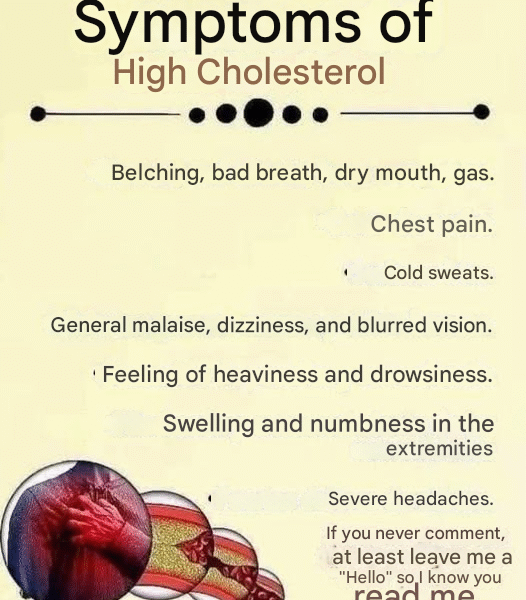Signs and Symptoms of High Cholesterol You Shouldn’t Ignore 🫀
High cholesterol is one of those silent health issues that can go unnoticed for years. Many people don’t realize they have high cholesterol until they face more serious problems, such as a heart attack or stroke. But did you know that there are warning signs and symptoms that might indicate your cholesterol levels are too high?
In this article, we’ll dive into what high cholesterol is, how it affects your body, and the warning signs you should never ignore.
💡 What Is High Cholesterol?
Cholesterol is a fat-like substance that is essential for building cells, producing hormones, and making vitamin D. However, there are two main types of cholesterol:
- LDL (Low-Density Lipoprotein): Often referred to as “bad cholesterol,” high levels of LDL can lead to plaque buildup in your arteries, narrowing them and increasing the risk of heart disease.
- HDL (High-Density Lipoprotein): Known as “good cholesterol,” HDL helps remove LDL from your bloodstream and protect your arteries.
When your LDL levels are too high and HDL levels are too low, it can lead to serious cardiovascular problems.
🚨 Signs and Symptoms of High Cholesterol
While high cholesterol doesn’t often cause noticeable symptoms right away, certain signs could indicate that your cholesterol levels are dangerously high. These signs are important to recognize, as they may be a clue that your body is struggling to keep things in balance.
1. Chest Pain (Angina) 💥
If you experience chest pain or discomfort, especially during physical activity or stressful situations, it could be a sign that plaque buildup is restricting blood flow to your heart. This condition is known as angina, and it often occurs in people with high cholesterol. If the plaque ruptures, it can trigger a heart attack.
2. Shortness of Breath 🫁
Difficulty breathing or feeling short of breath during normal activities may indicate that your heart is not getting enough oxygen due to narrowed arteries. This can be a result of high cholesterol causing plaque buildup.
3. Fatty Deposits Around the Skin (Xanthomas) 🟡
One of the more visible signs of high cholesterol are yellowish lumps or deposits of fat that form under the skin, typically around the eyes, elbows, knees, or hands. These are called xanthomas and are associated with very high cholesterol levels.
4. Numbness or Weakness in Limbs 🤚🦵
If you experience unexplained numbness, weakness, or tingling in your arms, legs, or other parts of your body, it could indicate poor circulation due to atherosclerosis (plaque buildup in the arteries). This is another potential sign that your cholesterol levels are too high and affecting your arteries.
5. High Blood Pressure 💉
Cholesterol buildup can contribute to the hardening and narrowing of your arteries, leading to high blood pressure (hypertension). If your blood pressure is consistently higher than normal, it could be a red flag that your cholesterol is too high and affecting your heart and blood vessels.
🩺 Other Risk Factors and Symptoms
Even if you don’t have the obvious symptoms listed above, high cholesterol can silently increase your risk of serious health issues. These risk factors may also indicate that you’re at a higher risk for heart disease or stroke due to high cholesterol:
- Family history of high cholesterol or heart disease
- Obesity or being overweight
- Smoking
- Poor diet (high in saturated fats and trans fats)
- Lack of physical activity
- Older age (risk increases after 45 for men and 55 for women)
🧑⚕️ How to Know for Sure
The only way to know for sure whether you have high cholesterol is through a blood test called a lipid panel. This test measures your cholesterol levels (both LDL and HDL) and helps determine your overall heart health.
If you’re experiencing any of the above symptoms or are at risk for high cholesterol, it’s essential to get a checkup from a healthcare provider. Early detection can help you manage your cholesterol and reduce the risk of complications.
🛑 What You Can Do About It
If you’re diagnosed with high cholesterol, there are several lifestyle changes you can make to lower it and improve your heart health:
- Eat a heart-healthy diet: Focus on fruits, vegetables, whole grains, and healthy fats (like those found in olive oil and avocados).
- Exercise regularly: Aim for at least 30 minutes of physical activity most days of the week.
- Quit smoking: Smoking can lower HDL and damage your arteries.
- Limit alcohol consumption: Excessive drinking can raise cholesterol levels.
- Manage stress: Chronic stress can negatively impact your cholesterol levels and heart health.
🌟 Final Thoughts
High cholesterol is often called the “silent killer” because it doesn’t show immediate symptoms but can cause serious harm over time. Understanding the signs of high cholesterol and getting regular checkups is essential for protecting your heart and overall health.
If you’ve experienced any of the symptoms mentioned, or if you’re concerned about your cholesterol levels, make an appointment with your doctor today. It could save your life.
If you found this information helpful, please like and share it with your friends and family. Together, we can help spread awareness about the importance of heart health and early detection of high cholesterol! 💓
Let’s take care of our hearts — one step at a time. Stay healthy and informed!
